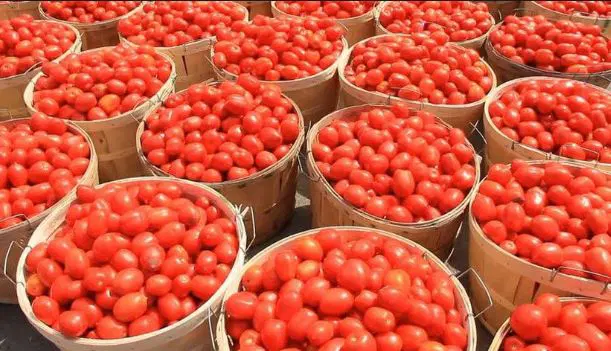Nigeria’s Tomato Crisis: Farmers Count N20bn Loss as Tuta absoluta Wreaks Havoc Nigeria is in the throes of a major agricultural and economic as tomato crisis in northern Nigeria reel from a devastating outbreak of Tuta absoluta, a pest that has decimated tomato crops across the region. In just two months, the losses have
Nigeria’s Tomato Crisis: Farmers Count N20bn Loss as Tuta absoluta Wreaks Havoc

Nigeria is in the throes of a major agricultural and economic as tomato crisis in northern Nigeria reel from a devastating outbreak of Tuta absoluta, a pest that has decimated tomato crops across the region. In just two months, the losses have been pegged at over ₦20 billion, with thousands of hectares of farmland affected and market prices soaring to unprecedented levels.
Tuta absoluta, commonly known as the tomato leafminer, is a notorious pest capable of causing up to 100% crop loss if not effectively controlled. This year’s infestation, which began in March, has been described by experts and stakeholders as one of the worst in recent memory, hitting major tomato-producing states such as Kano, Kaduna, Jigawa, Bauchi, and Plateau.
MTN Group Confirms Cybersecurity Breach, Assures Customers Of Platform Integrity
A National Kitchen Staple Under Threat
The impact has been felt far beyond the farms. In cities like Lagos, where tomatoes are a staple in nearly every household, the price of a crate of tomatoes has skyrocketed from around ₦8,000 to as much as ₦40,000, leaving families scrambling for alternatives.
In Kaduna and Jos, markets that are traditionally better supplied due to proximity to tomato-growing regions, traders and consumers alike are feeling the pinch. Alhaji Sani Danladi, National Secretary of the National Tomato Growers, Processors, and Marketers Association of Nigeria (NATPAN), confirmed that entire crops have been lost across large parts of the North.
“Farmers who planted in November and December have nothing to harvest. In just two to three days, Tuta absoluta can destroy an entire farm,” Danladi said. “Even in my own farm at the Kano River Project, everything was wiped out.”
Danladi further explained that the heat in the north exacerbates the problem, as tomatoes become more vulnerable in hot weather. He added that only a handful of local governments still have tomatoes to harvest, which is grossly insufficient to meet national demand.
Rising Prices, Dwindling Supply
Tomato traders across the country say the hike in prices is not only due to scarcity but also worsened by transportation challenges, fuel price hikes, and insecurity on highways. Hassan Musa, a trader at Mile 12 Market in Lagos, noted that tomatoes often arrive spoiled due to bad roads and excessive heat.
“By the time the produce gets here, half of it is already bad,” he lamented. “We have no choice but to increase the price to recover losses.”
This deterioration of perishable goods during transport is a common challenge that highlights the lack of cold chain infrastructure, poor road networks, and high logistics costs—factors that continue to undermine Nigeria’s food supply chain.
Lack of Support and Finance for Farmers
Beyond pest infestation, tomato farmers are also battling financial challenges. Bola Oyeleke, National President of the Tomatoes and Orchard Producers Association of Nigeria (TOPAN), said lack of access to affordable seeds, fertilisers, and mechanised farming tools have crippled small-scale farmers.
“Many farmers do not have the money for proper land preparation or to fight diseases like Tuta absoluta,” he said. “We need more technology and financial access. Without that, production will keep dropping.”
Oyeleke acknowledged the Federal Government’s efforts to scale up tomato production in the South-West and noted that TOPAN, in partnership with NIHORT, is distributing seeds and working with international bodies to secure fertiliser support.
However, he criticized the state governments in the North for playing politics with agricultural support, stating that real farmers have been largely left out of government assistance programs. “The aid often goes to political allies, not the actual farmers,” he added.
A Looming National Food Crisis
The ongoing crisis has led many Nigerians to seek alternatives, including canned tomato paste or simply avoiding the fruit altogether. However, with food inflation already squeezing households across the country, even these alternatives are becoming unaffordable.
Agricultural analysts warn that unless urgent steps are taken—including investment in irrigation systems, pest control programs, rural roads, and refrigerated storage facilities—such crises will recur, with even more severe consequences for food security.
“The recurring tomato crisis reflects broader vulnerabilities in Nigeria’s agricultural sector,” said one expert. “What we’re witnessing is not just a pest problem; it’s a systemic failure that must be addressed holistically.”
The Way Forward
To mitigate future occurrences, stakeholders are urging the government to develop a national strategy for pest management, provide targeted support to genuine farmers, and improve access to credit, inputs, and modern agricultural techniques.
In the short term, expanding production in unaffected areas and supporting greenhouse tomato cultivation could help ease supply pressures.
But for now, the losses are staggering, the markets are volatile, and millions of Nigerians are feeling the impact—both at the farm and on the dinner table.
















Leave a Comment
Your email address will not be published. Required fields are marked with *